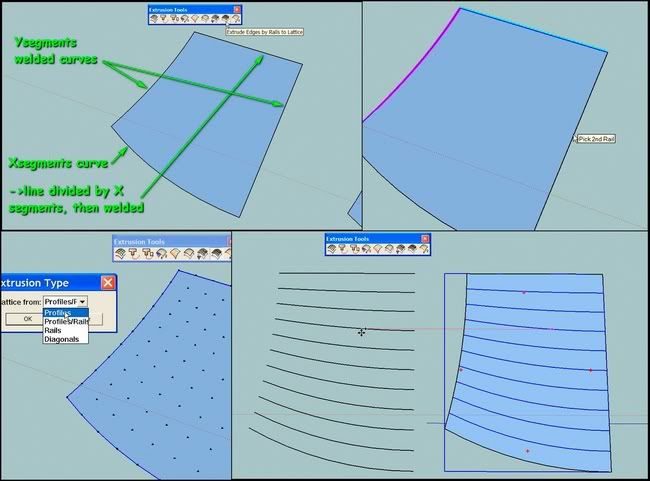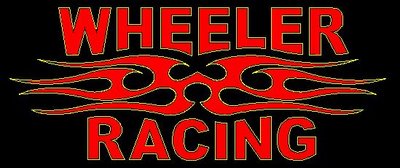2D curve wrap to surface cylinder-best method?
-
Hi Jeff and Dale,
very interesting conversation.
(.../yes, learning Su is very long also for me,.../yes I have also noticed some annoying wrong results,../)Dear Jeff, I have studied your Step by step with great interest too.
How do you "manually offset" the inner edges for the stringer in Scene 5
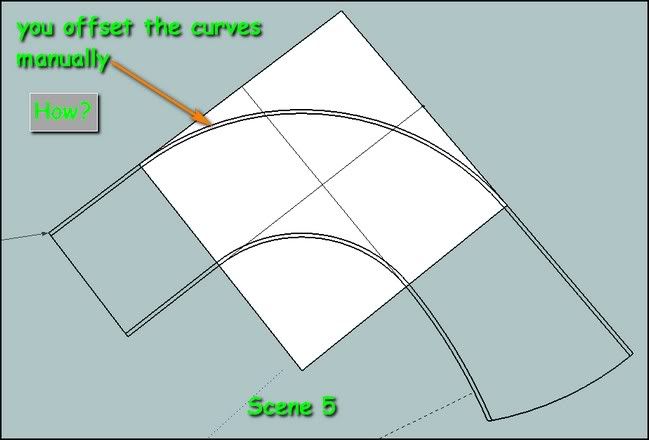
Drap tool (from Sandbox tools) is perfect to offset treads in Scene 6 (what a good idea)
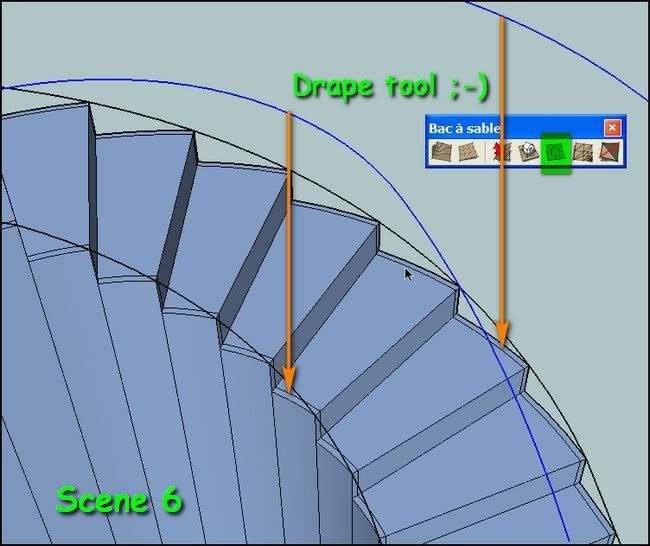
"TIG's "extrude edges by vector" extrudes theses lines vertically" Once again is a very good idea, very foxy! (thank you dear Tig) in Scene 7
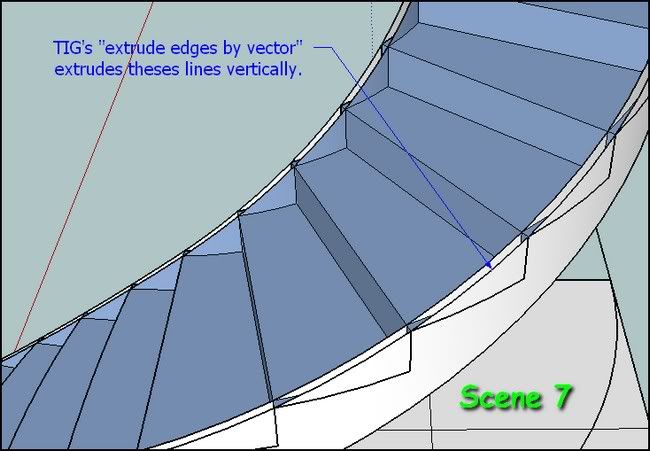
Dear Dale,
I'm afraid I've missed some steps of your stairs
mostly the way you'd used JPP?
Also I'm wondering if this break in the curve is whished?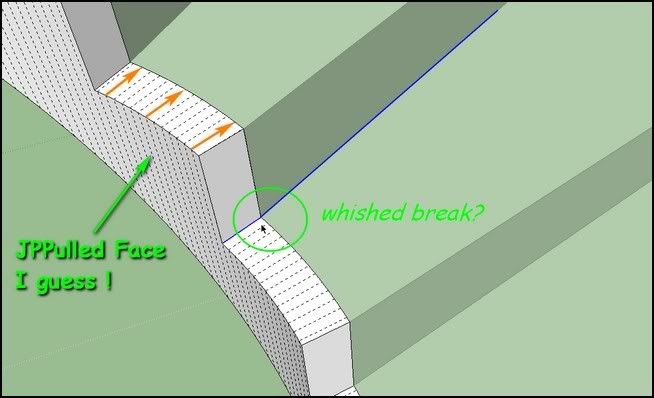
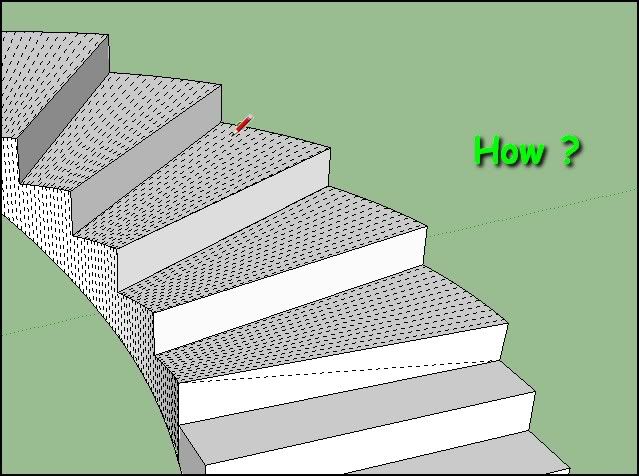
++simon.
PS: Rhino €995



-
Hi Simon
Thanks for pointing that weird geometry out. I can't explain it as the original stairs were laid out flat in plan view. PushPulled to the rise, grouped and moved using the move tool, to intersect at the bottom of each riser. you can see the groups all highlighted in the attached jpeg.
Then the stringer was PushPulled up, and the stringer shape drawn on the curve face using Tools on Surface. Then excess geometry erased.
As for the break in the curve, no you would want the face of the stringer to be a continuation of the angle of the riser. Good catch, and must be part of the anomaly with skp. geometry we are discussing.
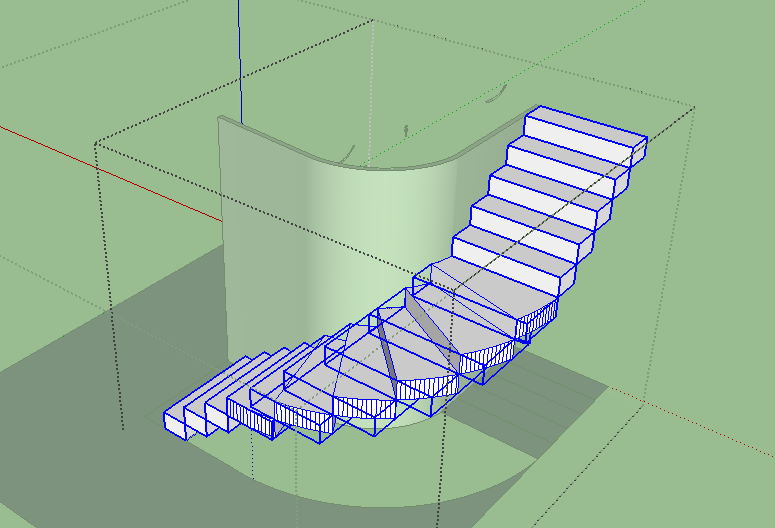
-
@dale said:
So in reality, if you are using Sketchup to "represent" objects, to give the impression of what they will look like, then you can accomplish that. And probably your clients will be happy.
But, if you are going to require the accuracy to build these objects, or send them to cad/cam then the way SketchUp handles geometry means it just won't always work. (in particular with curved geometry).i wouldn't go as far as to say sketchup should be for archviz only as it's extremely accurate for many situations.. it's just that it breaks down at a certain point in which, while still possible to make accurate drawings, the process to achieve such results becomes very convoluted..
(case in point, with this stringer, i would have to go through the method of manually drawing the stringer 12 or so times in order to actually build the staircase -- assuming there are 3 layers of laminating for each stringer, that's 8 redraws.. outer edge of the treads is another, 4 more for the laminated trim cap against the wall.. i only did it 5 times in the drawing i made as i didn't do the individual laminates etc and i already started getting a headache after that
 )
)with the proper software, i'm a lot more comfortable with drawing the initial shape once then using that to generate subsequent geometry instead of starting from scratch for each step..
@simon le bon said:
Hi Jeff and Dale,
very interesting conversation.
(.../yes, learning Su is very long also for me,.../yes I have also noticed some annoying wrong results,../)Dear Jeff, I have studied your Step by step with great interest too.
How do you "manually offset" the inner edges for the stringer in Scene 5
what i meant by manually offsetting was basically repeating the things i did in step one.. if i relied on sketchup to offset then the results would be wrong.. so yeah, the step by step just has me doing many of the same things over and over..
@unknownuser said:
PS: Rhino €995



p.s., for mac users, there's this:
http://mac.rhino3d.com/it's been in beta for a couple of years now and will probably be another year before it's officially released.. for the time being, it's free



(and better yet, the company that i do a lot of work for has two rhino licenses but they never use it so i have a transferable license waiting for me once V5 is ready for release)
-
This info is exactly what I've been looking for. Just checked back in and haven't had a chance to go through the posts in detail. Jeff, thanks so much----quickly scanning I can see there's much to check out.
What I've been doing is to confirm overall fit and lay-out in 3D with SU, but detailed templates and shop drawings get done in conventional 2D dwg's.
I've seen Rhino mentioned here, but did not understand that it might have something to offer. There's is a bit of resistance (mine) to learning a new bloody program!!
I'll be checking back in later----gotta go build something.
-
[/quote]
i wouldn't go as far as to say sketchup should be for archviz only as it's extremely accurate for many situations.. it's just that it breaks down at a certain point in which, while still possible to make accurate drawings, the process to achieve such results becomes very convoluted..(case in point, with this stringer, i would have to go through the method of manually drawing the stringer 12 or so times in order to actually build the staircase -- assuming there are 3 layers of laminating for each stringer, that's 8 redraws.. outer edge of the treads is another, 4 more for the laminated trim cap against the wall.. i only did it 5 times in the drawing i made as i didn't do the individual laminates etc and i already started getting a headache after that
 )
)with the proper software, i'm a lot more comfortable with drawing the initial shape once then using that to generate subsequent geometry instead of starting from scratch for each step..[/quote]
Sorry Dan this kind of goes beyond your original inquiry... but...
I don't want to sound like I'm trashing SketchUp. Not only have I been with it Since the AtLast days, but I really have a lot of fun with this software. That is what makes this particular problem so perplexing, as it looks like such a simple exercise, which as it turns out is very difficult.
Not one to give up I had another shot at it this morning, with a slightly different approach, and ended up with a real puzzle. I'll attach the file, which had the original curved shape pushpulled from plan view, all faces but the faces connecting the stairs erased, and then traced on the curved surface using conventional and TOS.
The resulting weird geometry is to say the least interesting. And the way it responds to joint pushpull is really interesting.
-
Now this is getting really weird. The file that uploaded is missing geometry. The file on my computer looks like this.
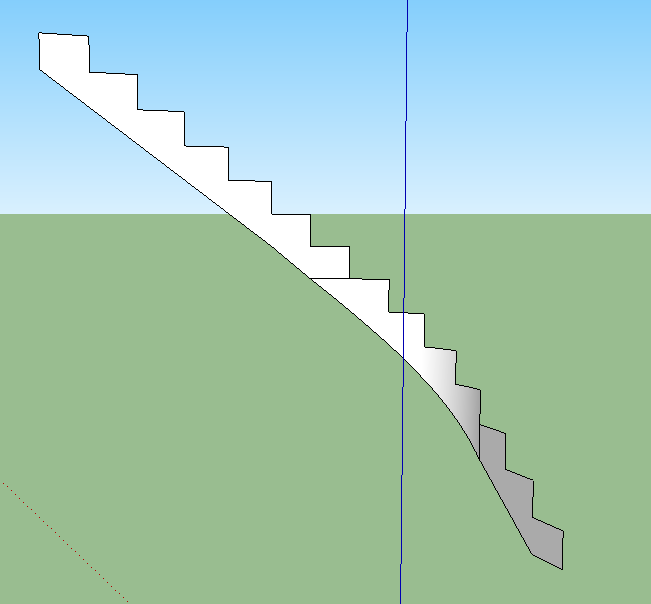
-
Hi,
the tool of choice for me would be a mixture of Bezier Curves and Shape Bender. Several parameters have to be better influenced, for example, the step width.
Charly
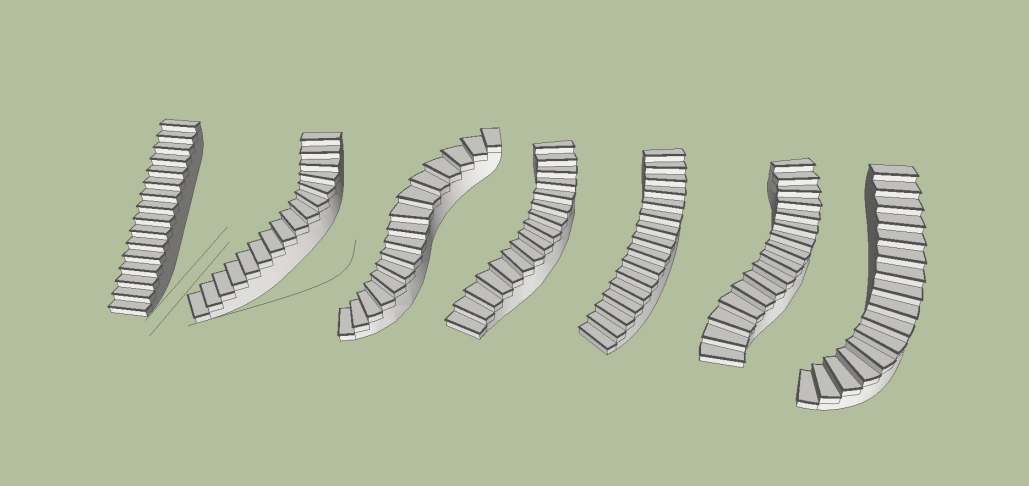
-
@charly2008 said:
Hi,
the tool of choice for me would be a mixture of Bezier Curves and Shape Bender. Several parameters have to be better influenced, for example, the step width.
Charly
yeah Charly, those are fine for visualizing.. you can't actually build those things though (not even close)..
-
Here is my quote:
@unknownuser said:
i didn't know what you did to make these curves on the first 5 steps so i took the
bottom step's radius buldge (approx 3 1/4") and divided by 5 which is 13/16".. the
5th stair has a 13/16" buldge, 4th is 1 5/8" etc..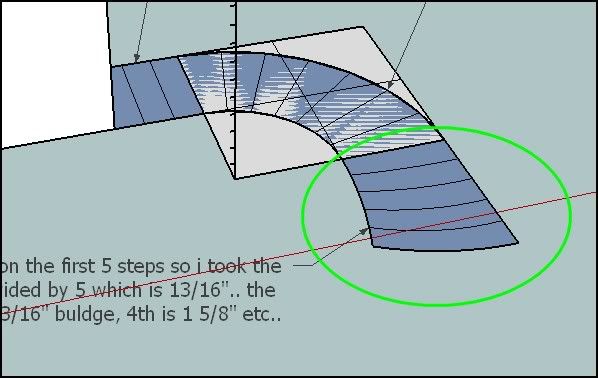
Here is a very quick and flexible way:
Using TIG's [Plugin] Extrude Edges by Rails by Face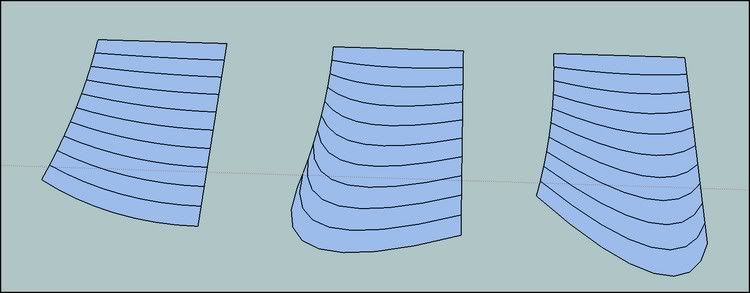
 simon
simonps: about Rhino I'm a Windows User.
-
super. just mark.
-
ps: about Rhino I'm a Windows User.
check out http://www.moi3d.com
About $200.00. Free 30 day trial. Coded by the same guy that originally coded rhino, has a simple elegant interface, and a fantastic clean sketchup export.
cheers
rabbit -
This has just been posted on the rhino forum recently (see screen shot)
Also, this site if you are into stairs:
cheers
rabbit
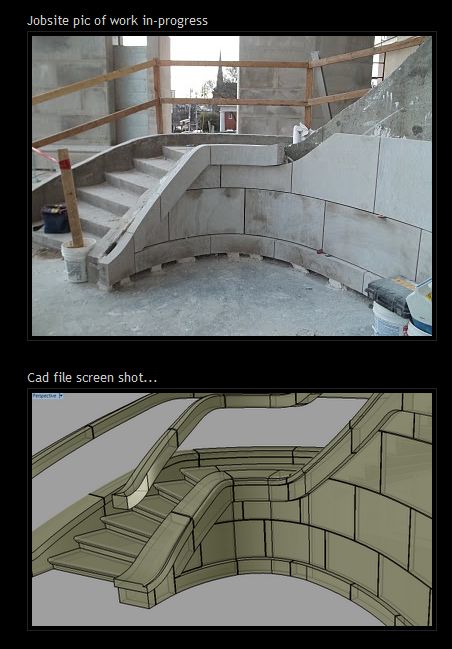
-
WOW this is one of my favorite threads in a long time.
Great info here on stairs thanks for the great tuts Jeff and all others who have made usefully posts.
Loving the stair porn link too.
I have built a few steel spiral and curving stair cases over the years and have also built railings that go on top of beautiful curving stringers with a wood top rail on the railing. My question is would you build the stringers in this thread in the shop or on site? Basically I am asking if anyone has a link or pics of these being built. Also any one have any 2D shop drawings of stringers like these that they would be willing to share?
Cheers
S
Advertisement
